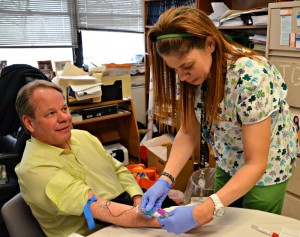Bill Ryan is assistant vice president in the department of government affairs for the Albert Einstein Healthcare Network. Today, sitting in a cramped lab area of the Einstein Medical Center, with his sleeves rolled up and a rubber tourniquet stretched around his upper arm, he looks like a patient, but he’s not. Maybe more like a guinea pig.
Rows of blood sample tubes are arrayed in racks on a table in front of him. They look like little church organ pipes. Nurse Maria Miranda swabs alcohol onto a small patch of skin on Ryan’s arm, and then, with the ease of someone with long practice, she inserts a needle. Soon one of those tubes is filling up with Ryan’s blood.
Ryan confesses to a bit of trepidation, but he’s really OK with it. This small donation is for a very good cause.
Ryan—whose name probably betrays his ethic heritage—is being tested to see if he is a carrier for Tay-Sachs, a rare, inherited neurodegenerative disorder that claims the lives of children who are afflicted with it, typically before they reach their fifth birthday.
It’s a pretty altruistic way to spend part of your St. Patrick’s Day.
Ryan is not alone. On a day far too often given over to partying, staffers at Einstein are observing the saint’s feast day in a way that is actually more in keeping with a saint’s feast day. They’re trying to raise awareness to what is believed to be a relatively high Tay-Sachs carrier rate among people of Irish descent. They’re wearing green, everything from cable knit fisherman sweaters to shiny plastic shamrock beads. At least one is wearing a kilt—in the national tartan of Ireland, of course.
And like Ryan, if they claim Irish heritage, they’re dropping by the lab to donate a bit of blood—all in the cause of determining exactly what that carrier rate is.
“I’m aware of Tay-Sachs, and the devastation that it causes,” says Ryan. “A least I can contribute in a small way.”
Tay-Sachs is commonly associated with Jews of Central and Eastern European descent. And with good reason. The Tay-Sachs carrier rate in the general population is 1 in 200 to 1 in 250. Among Ashkenazi Jews, the carrier rate is from 1 in 25 to 1 in 30.
Less well known is the disorder’s high carrier rate among other ethnic groups, including French Canadians, the Cajuns of Louisiana, and the Amish.
Einstein researcher and pediatrician Adele Schneider is intensely interested in nailing down the carrier rate among the Irish. Here’s why she’s so interested. Within the past several years, three new cases of Tay-Sachs were diagnosed in the Philadelphia area: all of them in children born to parents of Irish descent.
“It is remarkable,” Schneider says. “Until now, I had never seen a living child with Tay-Sachs, so uncovering three of them, all of them in this area, all of them in children in Irish descent … that would be pretty remarkable.”
Remarkable, yes—and heartbreaking.
Some medical literature suggests the carrier rate among the Irish might be 1 in 50. But there are other estimates, too, and they’re all over the place. Schneider suspects the less extreme estimates are likely to be more on target.
“I’ve read everything from 1 in 8 to 1 in 400—which is obviously wrong,” says Schneider. “We think it’s going to be something in between, about 1 in 50. That’s the empiric number we’ve been using, but we don’t have any data yet to support that. But even if we don’t come up with an absolute number, there’s enough reason to be concerned and the Irish community should know more about this.”
One way Irish-Americans and the Irish living in this country will come to know about Tay-Sachs will be through screenings just like the one at Einstein on St. Patrick’s Day.
“Today is just one in a series of screening we’re doing,” says Rebecca Tantala, executive director of the Delaware Valley Chapter of National Tay-Sachs & Allied Diseases Association, and Einstein’s director of grants, foundation & contracts, who was on hand at Einstein on St. Patrick’s Day. “We need 1,000 blood samples. We’re hoping for 600 or so locally, but we may also be going to Boston and New York. We’re looking for it to be a geographically diverse selection of individuals.”
No one can be sure when the researchers will hit that magic number, but, says study coordinator Amybeth Weaver, “we’d like it to be in the next year. The sooner we get 1000 individuals, the sooner we can complete the study.”
For Adele Schneider, that day can’t possibly come soon enough.
“To have a child coming into my office and to have to make that diagnosis … it was devastating to have to tell the parents, your child is not going to survive. This is not what I want to do. I want to say, let’s take steps to have a healthy child. It’s just so sad.”
Testing is provided at no cost. Study participants will be informed of their carrier status, and genetic counseling will be provided. The Einstein study is funded by the National Tay-Sachs & Allied Diseases Association of Delaware Valley. For details: http://www.tay-sachs.org/irish_taysachs_study.php

